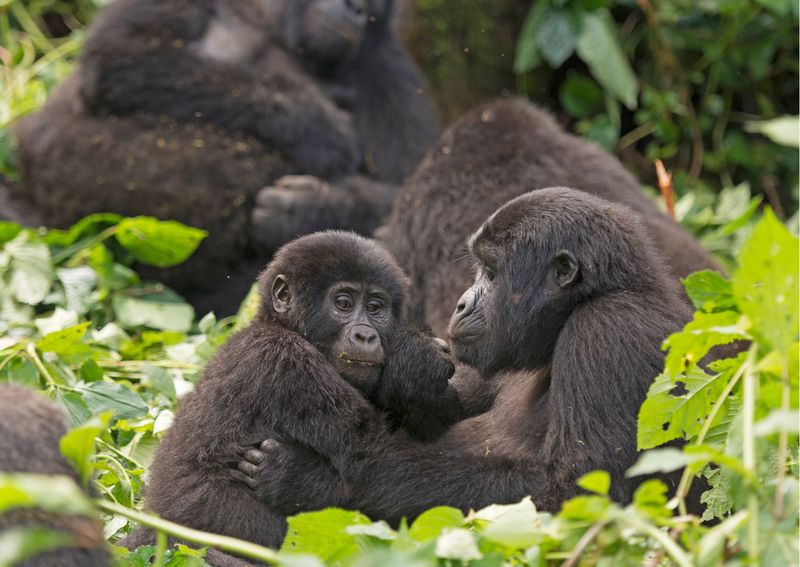Bwindi The impenetrable forest is an amazing National park located in the Southwestern part of Uganda, covering 321 square kilometers at an altitude of 1,160M to 2,607m above sea level.
The forest covers mist hills, it is a rain forest and referred to as impenetrable due to its heavy vegetation cover which makes access almost impossible. The forest was declared a UNESCO Natural World Heritage site in 1994.
Bwindi Impenetrable National Park has more than 460 Mountain Gorillas almost half of the world Mountain Gorilla population, about 400 plant species, 120 species of mammals including; Forest Elephants, Primates like baboons and chimpanzees, and an estimated 350 species of birds
including 23 Albertine rift endemic species.
Location, Proximity, and Access:
– Buhoma is approx. 9 hours from Kampala/Entebbe.
– Accessed by flight via Kihihi Airstrip, 1hr 45min flight from Entebbe
Approx. 45 Kms, 1hr 15 Minutes’ Drive Kihihi to Buhoma.
– Buhoma is a 60km 1hr 40 min drive from Ishasha Sector of Queen Elizabeth.
– Approx, 46 km, 1hr and 40min drive from Ruhija sector. Gorilla groups in Ruhija Sector can trek while staying in Buhoma since the Ruhija sector does not have Luxury lodges.
Activities and Experiences around Bwindi:
– Gorilla Park
Gorilla Trekking, there are 21 gorillas habituated/ trekking groups including 1 for research purposes in Bwindi Impenetrable National Park. These are found in four major regions of the park where trekking takes place. Buhoma which hosts the park headquarters and with the oldest group, Ruhijja, Nkuringo, and Rushaga which has the highest number of gorilla groups. Each of the Gorilla groups is allowed a maximum of 8 permits or eight visitors per day and trekking commences at 8 am with a briefing.
Gorilla Habituation Experiences, are also available where you accompany researchers into the forest for purposes of making the unhabituated gorilla groups accustomed to human presence. This experience lasts for the whole day from morning to evening.
– Batwa Walk, Bwindi forest used to be a shelter to the Batwa. These are pygmies (very short) marginalized and endangered groups of people, who traditionally lived in the interior of the forest in caves. The Batwa are hunters and fruit gatherers who were relocated and now live on the edge of the forest due to conservation purposes. Take a walk into the forest to the caves led by the Batwa guides themselves as they take you through the authentic experience of their lifestyle in the forest.
The Batwa Walk takes about 7 hours, however, there is an alternative (replica) of the same, known as the Batwa Experience where you will visit the sites at their current settlement and take you through a staged experience of their lifestyle. This can happen on a community walk which usually takes about 3 hours.
– Community Walks, through villages on the forest edge at Buhoma and Nkuringo, provide experiences of the lives of the local Batwa (Pygmy) and Bakiga people who inhabit this area.
The park is located in the Kigezi region the home of the Bakiga, a farming tribe of people who are responsible for the striking terraced hillsides that extend up to the edge of the forest to the south of Bwindi.
There are several community projects including schools, hospitals, and production workshops which were started as responsible tourism initiatives to conserve the forest, some of these can also, be visited on a community walk.
– Nature Walks, though the park is famously known for gorilla trekking, there are many interesting experiences in Bwindi, Nature walks with various trails like; the Munyanga River Trail, Waterfall trail, Rushara Hill Trail, Muzabairo loop trail, and Ivi River Trails all provide stunning opportunities of experiencing Bwindi forest national park with scenic views and opportunities to see birds, primates, and other wildlife in the forest.
– Birding, is done along four major birding trails with excellent opportunities of seeing the top bird species. The River Ivi Trail between Buhoma and Nkuringo is recommended as well as Buhoma’s forest-edge Munyaga River Trail, Ruhija’s Bamboo Trail, leading to the 2607m Rwamunyoni peak and Mubwindi Swamp Trail are renowned for Albertine Rift endemics including the localized green broadbill.
For more details and to plan a tailor-made kosher safari trip in Africa – contact us now!



